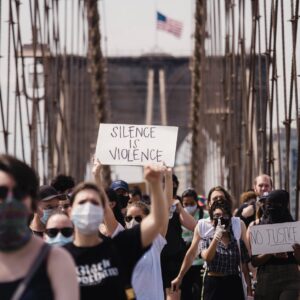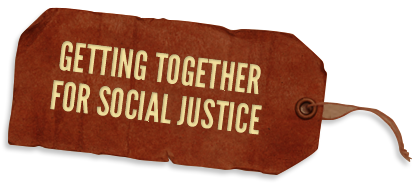10 Suggestions for Stronger Solidarity
By JLove Calderon and Tim Wise for Medium

Photo by Life Matters from Pexels
This document was initially created several years ago. In light of recent events, we felt it would be helpful to revise and re-release it in the hopes of engaging white Americans about how to show up in the Movement for Black Lives and racial justice.
We stand at the precipice of a defining moment for the United States. Amid a pandemic that is disproportionately impacting communities of color, Black activists are leading an uprising unparalleled in our nation’s history. While the growing rebellion is directly in response to the police and vigilante murders of George Floyd, Breonna Taylor and Ahmaud Arbery, its roots lie in the centuries of racial oppression that have defiled this land since the colonial period.
In concert with Black leadership, millions of people, including millions of white folks, have spilled into the streets to demand a new society. Elsewhere, in workplaces, schools, and homes across the country, white Americans are waking up to the realities that Black folks and other people of color have been living with for hundreds of years.
While these developments are filled with possibilities, they are also fraught with dangers. Among these risks are backlash from the far-right, co-optation by reformists unwilling to undo systemic problems identified by the movement, and the danger that white folks will give insufficient thought to our role and responsibilities in this struggle.
We believe it is vital for white Americans to take up this fight. We also believe that doing so requires an introspection that is sometimes missing from white anti-racism efforts.
Introduction: How We Envision the White Role in The Struggle
We are persons classified as white in this society. As aspiring anti-racist allies/collaborators, we seek to work with people of color (and follow their leadership) to create real multiracial democracy. We do not fight racism on behalf of people of color, or as an act of charity. We oppose white supremacy because it is an unjust system, and we believe in the moral obligation to resist injustice.
While white supremacy principally damages people of color, we believe it compromises the humanity of white people and poses risks to us all. In this sense, although Black and Brown folks are the targets of this system, white people are collateral damage. Because we understand white supremacy as a contributing factor to war, resource exploitation, and economic injustice, we see eradicating the mindset and system of white domination as a matter of collective preservation. Racial justice work is not something we should do for Black and Brown folks. It is something we must do with them.
To build this new society with integrity, we believe it will help to operate with a code of ethics in mind. We know from experience how easy it can be to act with the best intentions and yet harm the anti-racist struggle by choosing tactics or methods that reinforce privilege and inequity, and undermine Black and Brown leadership.
As the number of whites engaged in anti-racism efforts expands, it will be vital to ask: How can we operate ethically and responsibly as we work toward helping to dismantle white supremacy?
To this end, we propose the following code of ethics for anti-racist white allies.
Code of Ethics for Anti-Racist White Allies/Collaborators

1. Acknowledge our racial privilege (in general and in our anti-racism work)
Self-reflection matters. Although there are many ways that white people are marginalized in this society (based on gender, sex, sexuality, class, religion, disability, etc.), this truth does not eradicate our racial advantage relative to people of color.
Most whites involved in anti-racism efforts recognize white privilege as a general truth. But we often miss how it extends to our anti-racist activism. We will typically be taken more seriously in this work precisely because we are white. Our voices will carry, and our ideas will be given more credibility than the insights of Black and Brown peoples. Being clear about this can help us know when to speak and when not to speak. It is possible to use privilege effectively, but only if we understand how its deployment can marginalize the very persons with whom one hopes to act in solidarity.
2. Develop/deepen our connections to people and communities of color to help maintain anti-racist accountability
Accountability matters. People of color are most affected by racism and have the most to gain or lose from the way anti-racism work is done. With this in mind, we believe it is essential to engage regularly with Black and Brown people in our lives as a way to better ground our efforts in structures of accountability.
Although accountability will play out differently, depending on our specific job or profession, as a general principle, we should be in regular and ongoing dialogue with persons in the communities that are most impacted by white supremacy — namely, people of color. The last thing people of color need is for white anti-racists to go solo when it comes to organizing and educating others. By creating feedback loops that facilitate dialogue with (and critique from) persons of color, we ensure that if we sing, we do so as part of a chorus, and on key.
3. Be prepared to alter our approach if and when people of color give feedback or criticism about our methods and practices
Responsive listening matters. It’s not enough to be in contact with people of color as we go about our work. We also need to be prepared to change what we’re doing if and when they suggest there may be problems with our existing methods of challenging racism.
Don’t misunderstand: accountability does not require that we follow every direction offered by a person of color, or accept every critique issued by a person of color about our efforts. There are roughly 100 million Black and Brown peoples throughout the United States, with different opinions about the issues, and the role of whites in the work. Obviously, we can’t respond affirmatively to all of them. However, if people of color who are part of this movement are regularly telling us something is wrong with our practices, accountability requires that we take the criticism seriously and seek to correct the practice.
4. Develop feedback and accountability structures with other white people too
Support structures matter. As we work to reach a broad base of white people, we must listen to those with whom we are working, and be willing to offer feedback (and receive it) openly and honestly. Because white supremacy encourages a mentality of individualism and arrogance, white anti-racists can fall into the trap of isolating ourselves from other whites and refusing to struggle with them around issues of racism and injustice. This is especially true when it comes to working with those who are hard to reach, defensive about these issues, or whom we perceive as less ideologically “evolved” than ourselves.
Research on white racial identity development indicates that as whites become aware of injustice (and the privileges to which we have had access), we tend to feel anger and hostility towards other whites who don’t see what we see. But such hostility does not help the struggle for justice. Although there are times we must call our people out for racist behaviors, equally or more important is “calling people in” to the work. Being in community with white folks, listening to them, and both offering and being open to feedback can help encourage a new anti-racist white identity by building community internally.
5. Acknowledge the Black and Brown base of our insights and knowledge when it comes to matters of race and racism.
Giving credit matters. Because we have been socialized to ignore or dismiss the observations of people of color, when another white person speaks about social and racial injustice, it can be a huge “aha!” moment for the previously inattentive white listener. We should make sure people know that whatever wisdom we possess on the matter is only partially our own: it is also the collective wisdom of people of color, shared with us directly or indirectly.
Beyond noting the general contribution of people of color to our racial understanding, we should strive to specify those people of color and communities of color from whom we’ve learned. Encourage others to dig deeper by seeking out, reading, and listening to the words and work of those people of color.
To facilitate this end, we should be sharing links, essays, videos, and other source materials from peoples of color on our social media. We should amplify Black and Brown voices, not just for a day or a week, but always. If you regularly post on Twitter, Instagram, Facebook, or elsewhere, try and post at least one piece of content from a person of color for every piece of your own content that concerns racism. Signal boost whenever and wherever you can.
6. Share access and resources with people of color whenever possible
Networking matters. As whites, we often enjoy access to professional connections, resources, or networks from which people of color are typically excluded. The ability to act as a gatekeeper comes with the territory of privilege. There is no escaping that role. The only question is, will we help open the gates wider or keep them closed? As allies, we should share connections and resources with people of color whenever possible.
For instance, we may have avenues for institutional funding or grant monies that could be obtained for people of color-led community organizations. We may have connections in media, educational institutions, or even the corporate world, which could provide opportunities for people of color to gain a platform for racial justice efforts, or simply job opportunities and other benefits. We should open up our networks and make sure that Black and Brown folks know about opportunities from which they might otherwise be excluded.

By Bamlou via Getty
7. If you get paid for some form of racial justice work, donate or direct a portion of your income to people of color-led organizations working to challenge racial injustice
Giving back matters. We believe it is fine for white people to work on racial justice either full- or part-time (organizing, civil rights legal work, teaching, etc.). It is also necessary and proper for people to be paid for the work they do. However, whites who do this work must acknowledge that at least some of the financial reward we receive is due to racism and white privilege. Because so much of our understanding of race and racism comes from the collective wisdom of people of color, it is only proper that we give back to those who have made our work possible.
Although the precise value of Black and Brown wisdom to white allies cannot be calculated, it seems reasonable for whites who receive income from anti-racism efforts to redirect at least 10 percent of it to people of color-led organizations. Consider it a racial justice tithe.
In addition to direct donations and the redirection of funds, white anti-racists could donate time or services to people of color-led organizations — from legal services to accounting services to volunteer time to fundraising services, etc.
8. Get involved in a specific, people of color-led struggle for racial justice
Organizing matters. If we are not fighting against racism in policing, education, immigration policy, and elsewhere, or for anti-racist practices within our institutions, what are we modeling? How are we learning? What informs our work? Can we be accountable to communities of color if we are not politically involved in some aspect of anti-racist struggle? We should connect with local racial justice organizations whenever possible — not only when it’s time for a demonstration or march, but for the long haul and when the cameras are gone.
There are also white anti-racist formations that work directly in solidarity with Black and Brown-led organizations and help white aspiring allies develop their commitment, accountability, and approaches for doing the work. These include SURJ (Showing Up for Racial Justice), White People 4 Black Lives, and the Catalyst Project. SURJ has over 100 chapters around the country, most of which have their own social media accounts, and which regularly announce events and opportunities to deepen our involvement in solidarity efforts.
9. Make all our political work anti-racist and all our anti-racist work political
Connections matter. To be true allies, we need to ensure that our political work around issues in the community — and electoral strategies and candidates — is informed by an anti-racist lens. We must prioritize racial justice and equity in that work and demand that candidates for office have serious racial justice platforms and agendas if they hope to secure our votes.
Likewise, our anti-racism should not be focused merely on particular injustices (like police killings of Black and Brown peoples), but tied to a political framework that links it to a broader array of issues. This means grounding our work in a historical and political understanding of power and how it operates in America. It means seeing the political connections between police brutality, underfunded schools, environmental racism, a nonchalant response to COVID-19, and the war on immigrants of color, among other issues.
10. Don’t forget to take care of yourself.
Self-care and healing trauma matter. Even though whites are not the targets of white supremacy, we are damaged by it. To be socialized in white supremacy is to internalize unhealthy messages about our own superiority. These messages cut us off from people of color, and create destructive pressures to perform and succeed to uphold preconceived notions of excellence. The pressure to meet these expectations is traumatizing and leads to internalized shame when we fall short (as we all do from time to time). In addition, as we strive to become anti-racist, we may internalize shame for the system we have inherited — which is neither liberating for people of color nor sustaining for us.
To show up as whole human beings, we need to be committed to the social, emotional, and spiritual work of healing trauma and pain. When we don’t do our personal work — it shows up in how we show up. Indeed, showing up at all can be difficult if we are operating from a place of shame, blame, or pain. How we communicate, how we relate to others, understanding our damage, and how to handle it — all of this matters when we are in this movement for the long haul. Collective liberation requires personal transformation, and yet none of us are free until we all are. Do. Your. Work.
Conclusion and Acknowledgement
This code’s premise is simple: White people have a moral and practical obligation to challenge racism responsibly. To this end, we believe that the above principles are essential starting points for whites engaged in efforts to eradicate racism and white supremacy. We hope this code will prompt constructive dialogue regarding how white allyship can best be developed and deployed to build real multiracial democracy.
This code was initially conceived by JLove (Inspire Justice), who then joined with Tim. Together they wrote the first draft of the code. That draft was sent out to a multiracial, intergenerational group of activists, organizers, educators, artists, and everyday people who care deeply about social and racial justice. Input was given, and the authors took vital insights and themes and incorporated them into the editing process. We thank everyone who took the time to bring their wisdom and expertise to the table for this accountability work.

